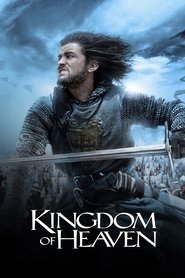You can't help shake the idea that it goes on longer than the Iraq war eventually did. Obviously influenced by contemporary images and ideas about the wars in the Middle East (the siege weapons reminded me of cruise missile…), Ridley Scott flounders in his attempt to fix Christian—Muslim relations once and for all.
I suppose his intent is admirable in its own way, however off-the-mark the result ended up being. Its geopolitics, history and theology are mostly at a sophomore-level of accuracy, and it is all conveyed through a decidedly insipid neo-orientalist view of 'Eastern' culture. Indeed, the movie is curiously disengaged with all of these weighty topics; it's strangely emotionally lightweight despite its heavy metaphysical themes and epic visuals. (In this sense, it reminded me somewhat of the recent The Three Musketeers: D'Artagnan movie.)
That said, this nu-medieval, 3½ hour version of *Alladin* filmed in IMAX makes no obvious errors, yet it takes no risks save for $130 million of investors' money and many hours of audience time. However, what was with the eclectic soundtrack? The chorale from Bach's St. Matthew's Passion (i.e. a work extolling the death of 'noble' Jesus) weirdly underscores the murder of a crass functionary. And despite the big-name cast, nobody stands out at all, acting-wise: at least of all Orland Bloom. Maybe Marton Csokas's portrayal as the wonderfully vain Guy de Lusignan, who felt very much like Maury Chaykin's turn as 'Nerus' on Stargate SG-1. There is a rather spiritless speech by Bloom before the final siege sequence (which itself was clearly ripped off from The Two Towers' Helm's Deep…), which only made me pay attention to what he was really saying, as it grossly frames the concept of 'knight' as being a kind of battlefield commission in the modern sense, rather than a medieval class position. And speaking of poorly-judged homages, I believe there's an explicit visual reference to the Russian version of *War and Peace*, where the camera pans up to see the circling cavalry.
Writing when it came out, Roger Ebert got one thing right about this film: namely that "few people will be capable of looking at Kingdom of Heaven objectively." But almost two decades on, despite Ridley Scott's attempt at an "all religions are equally welcome in Jerusalem!" middle-ground, the climax of the movie reverts to the old trope of the evil Saracen attacking the noble Europeans whilst shrieking alluha ackbar. (Still, Ebert is laughably wrong that this movie "is better than Gladiator — deeper, more thoughtful, more about human motivation and less about action". And he gets my goat just a little further on when he believes the old trope that "When you've made both sides angry, you may have done something right.")
Thomas F. Madden, Director of Saint Louis University's Center for Medieval and Renaissance Studies, criticised the film's presentation of the Crusades:
Given events in the modern world it is lamentable that there is so large a gulf between what professional historians know about the Crusades and what the general population believes. This movie only widens that gulf. The shame of it is that dozens of distinguished historians across the globe would have been only too happy to help Scott and Monahan get it right.
The death of his wife has made Balian question his belief in God, a crisis that serves the character but robs the story of both narrative thrust and purpose, since it means that Kingdom of Heaven is effectively a Crusades movie without a convincing crusader. […] In this context, Balian initially comes across as a kind of ecumenical Hamlet, pondering not death but belief, and then, when forced to protect Jerusalem against Muslim troops, a proto Henry V who rallies the faithful with yet another iteration of the St. Crispin Day's speech. […] One of the reasons that Gladiator worked as well as it did is that its star, Russell Crowe, could credibly put across one of Mr. Scott's typically anguished and existentially lonely heroes while wearing a skirt and gargling some very unfortunate lines. It takes an actor as self-serious as Mr. Crowe to carry the weight of Mr. Scott's ambitions; it also takes a story Mr. Scott himself can really believe in for the filmmaker to do the same.
— Manohla Dargis (New York Times)

